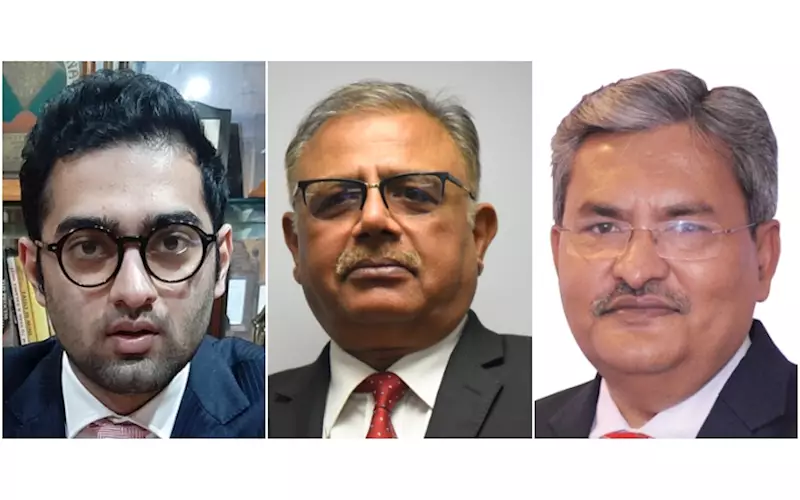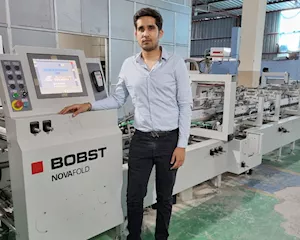Virus to vanquish print? No chance, say industry leaders
Economic headwinds and the paper price crisis have trimmed India’s print industry growth. Rahul Kumar talks to three manufacturers who say they are hopeful about the future
10 Nov 2021 | By PrintWeek Team
Rahul Kumar: 73% of our industry has reported a decline in sales so far this year. What is your view?
Rishab Kohli: We have seen an uptick in comparison to last year in sales both domestically and exports. However, the uptick in exports is higher than in the domestic market in the first two quarters.
Sangam Khanna: Yes, there has been a decline in business in Q1. But Q2 sees a recovery, and the occupancy of our customers is nearing back to 70 % to 80% spread across regions in commercial printing. However, this may differ with the availability of manpower and raw material. The way forward seems to look positive for Q3 – what with the schools and markets opening up. The situation appears to be improving and back to pre-Covid levels.
Vinay Kaushal: I am curious about the 73% figure as almost everyone is reporting a decline except for food packaging. As per my discussions with customers across India, people say that business is back to around 75% in most sectors, except the publication sector. Indeed, the decline will be there.
Rahul Kumar: Small print businesses (below Rs 10-cr turnover) could be the worst impacted from this continued slump. What is your view?
Rishab Kohli: In an economic slump, the smaller businesses are impacted due to lack of cash flow or the financial ability to weather the storm. The key for them must be to be extremely cost-conscious. Also, they need to make sure that they have the capacity to take advantage when the markets open up in order to recover and grow.
Sangam Khanna: The situation with commercial and publishing converters is still volatile, with accumulated losses during the Covid times. I feel it may take a while before things return to normal working. As per our understanding, the Covid-19 crisis has seriously impacted cash flow for most commercial and publishing converters. The market sentiment indicated hunger for growth as the demands are likely to pick up across the sectors with mega festivals around the corner.
Vinay Kaushal: Small businesses are the ones to have taken the maximum hit. Cashflows plus the ever-increasing input cost of paper and other materials are also affecting them. They do not have the capability to purchase and stock in bulk.
Rahul Kumar: Many printers say the schools and colleges re-opening; and festive season sales represent an opportunity for the next quarter. What is your view?
Rishab Kohli: There is an opportunity in the next quarter. Due to the Covid-related economic slump, there is a pent up demand. This is the case for most industries. The key is that the print industry and its stakeholders must be ready to service this excess demand and take advantage. Those who do this will do well.
Sangam Khanna: The reopening of schools and colleges will impact the growth in the segment. We see that virtual teaching may continue. However, school reopening will affect the decision as many (private) schools have sold most of the books. But the government or the CBSE / NCERT/ state books may see a jump in production. This demand will be good enough if the Covid situation is managed well and kept under control; plus, the government maintains the vaccination pace.
Vinay Kaushal: Yes. This is correct. Month by month improvement in job inflow has been seen. If this festive season passes without a major issue (for example, no Third Wave), we should see good growth in the last quarter of the financial year.
Rahul Kumar: Almost everyone (manufacturers, suppliers and customers) is concerned about the impact of price hike and raw material availability. What is your view?
Rishab Kohli: The price hike is a huge concern. Raw material prices are increasing at unfathomable rates. If this continues, it will lead to huge issues for printers, manufacturers, and eventually the end-consumer.
Sangam Khanna: No one likes a price increase in any industry. The price hike in raw material was inevitable as the international freight cost by sea is up ten times. The paper pulp, steel and aluminium industry and the semiconductor industry fall back has severely impacted the price increase. The end-user will have no choice but to take this issue with a pinch of salt. This is a fact, and the industry has to address this.
Vinay Kaushal: Correct. Price hike in multiple areas coupled with the shortages due to policy and logistic issues is a concern. The industry has to deal with this for at least one year.
Rahul Kumar: Industry leaders are concerned that changing local health conditions could result in the need for fast marketing pivots and quicker on-ground strategies. Agree / disagree? One thing you have done in recent times?
Sangam Khanna: Yes, things are not the same. The issues related to safety are a big concern as the health and safety of the staff are of prime concern at Komori. We have had our share of ups and downs during Covid-19. There is no quick fix apart from following the appropriate Covid behaviour. We have made vaccination mandatory for all team members in Komori.
Vinay Kaushal: Correct. For the last one and half years, local health conditions and restrictions have posed a significant challenge. Team safety is critical, and all our efforts are focused on the same.
Rahul Kumar: However, despite the uncertainty, the industry feels better prepared than during the beginning of the dreaded Second Wave. What is your view?
Rishab Kohli: I feel all of us are much better prepared. This year has been a strong start for Orient. Having said that, we aim to continue to innovate and grow regardless of external conditions. The key to surviving in this scenario is operational flexibility and understanding customer needs.
Sangam Khanna: There will always be a surprise element that awaits at every nook and corner. As I understand, no preparation is good enough as Covid keeps surprising us in new ways that the human race has not anticipated until now. However, we can only keep pushing our team members to follow Covid appropriate behaviour and take safety precautions. Also, we should wait for the health authorities to update us on what precautions we need to take.
Vinay Kaushal: Agree. Everyone has been preparing to counter the effects based on the lessons learnt during the First and Second Wave. Learning from the two waves have given us some confidence in dealing with the crisis. Though, if the Third Wave strikes (god forbid!), it might pose a different set of challenges and cause a deadly impact (though I sincerely hope there is no Third Wave).














 See All
See All